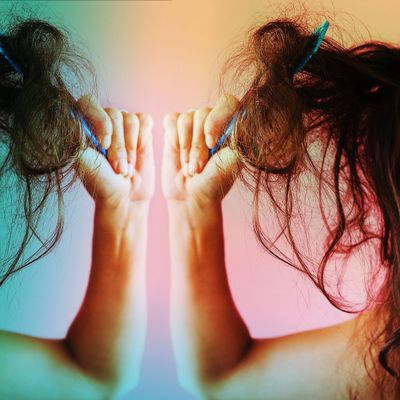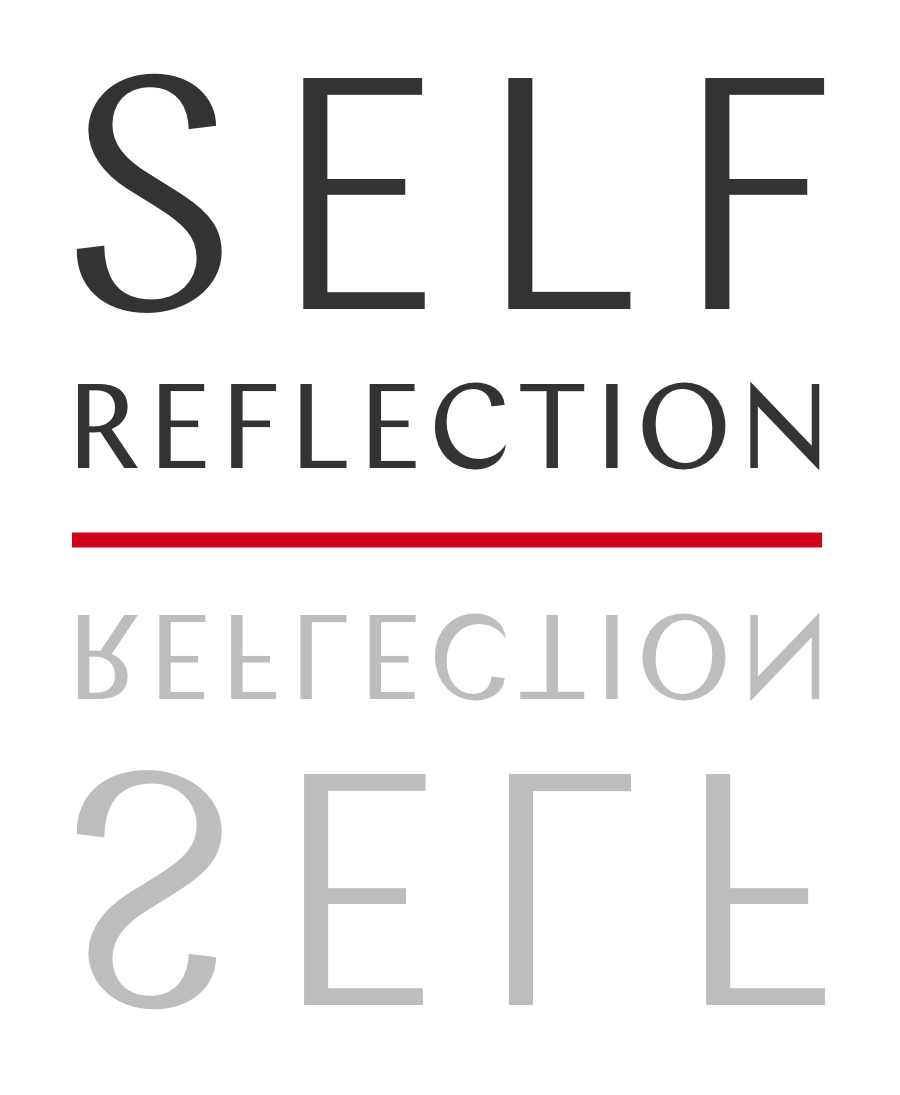
Self/Reflection is a week of stories on The Cut about how we feel, versus how we look.
My hair fell out like Hemingway’s dissolute Scotsman fell into bankruptcy: gradually, and then suddenly. I was not thinking about Hemingway when I started to find my hair on the floor, in the shower, in the bathroom sink, in the kitchen sink, on my laptop keyboard, wrapped into the leaves of my houseplants. I was thinking If this doesn’t stop, there’s not going to be anything left.
Until that point, three years ago now, I would have defined my relationship with my hair as one of benign neglect. I did not own a blow dryer, or a hair product other than a can of mousse I did not know how to use. I washed it, conditioned it, and let it do what it wanted: fall about five inches below my shoulders, in a sort of wavy-curly situation that is the genetic meeting point between my mother’s ruler-straight Scandinavian hair and my Dutch Caribbean father’s black quasi-Afro. The individual strands were delicate, but there were enough of them, considered collectively, that I could wear my hair up, or down, or hide behind it.
I could not understand why it was falling out, though I had my suspicions. There were new variables in my hair equation. I had recently been diagnosed with a pituitary gland tumor, which required four prescription drugs. Two might cause hair loss. But no, my doctor said: It was more likely that my hair would have fallen out before I started treatment, when my body chemistry had been out of alignment.
I printed anecdotal reports of hair loss related to one of my medications and presented them, stapled, to my doctor.
“Anecdotal,” he said.
I had moved to Paris a year earlier, and I knew enough French at that point to understand what all the “anti-chute” supplements in the pharmacies were meant to treat. I researched the chemical properties of the mineral-rich Parisian water, which left such a thick layer of sediment on my dishes that I had given up using my dishwasher to scrub them all by hand. Nonetheless: The water, all the experts said, might leave it lank, but would not make it fall out.
I Googled with increasing desperation. Most of what I tried — home remedies on Pinterest, biotin supplements, DIY coconut oil scrubs — made it worse. I scanned hair-loss forums with posts written in varying levels of despair. I seemed to have half the hair I once had had; I started wearing it pulled to one side.
I returned to my endocrinologist with more printouts. I knew there was a substitute for the most likely suspect among my four prescriptions, which people took during pregnancy. “Could I change to that?”
“Only for three months,” he said. “Taken indefinitely, it will destroy your kidneys.”
“And we wouldn’t even really know how it was affecting my hair after just three months,” I said.
My doctor gave me the sort of look he gives me when he thinks I am missing the larger picture. “Alternatively, we could remove your thyroid,” he said, explaining why, from a non-hair-centric perspective, surgery might be a reasonable option. Incidentally (to him, centrally to me), it would mean that I’d no longer need to take the possibly hair-damaging drug.
“But can we be sure about the effects on my hair?” I said, half-joking, but really not joking at all.
I sent before-and-after pictures to my family and friends.
“I don’t see it,” my mom said.
Because I could not fix it, I ignored it. I cut my hair infrequently, ensuring my split ends became worse. I walked around in ponytails and buns, despite the fact that avoiding elastic bands is a foundational practice of hair repair. My hair looked like a raccoon nest. My scalp, meanwhile, seemed coated in a layer of residue, no matter how long I rinsed it.
If I saw a mirror, I ducked, or closed my eyes until I’d passed it.
Then, two years after I discovered a hair wrapped into the tines of a fork on a drying rack, I went to New Jersey for Christmas. My 72-year-old mother — her hands wrapped around her own, full ponytail, newly grown out, gray and lustrous, so much like mine but better — took one look at my hair and said, “I see what you mean now,” she said. “I couldn’t see it when mine was short. You need a doctor.”
I took the first dermatology appointment I could get.
I handed the doctor a list of my medications and the same stapled reports of medication-induced hair loss.
She asked if I lived near a nuclear reactor.
“It’s breaking off in my hands,” she said, preparing a sample for biopsy.
Her best guess at the start of our appointment remained her best guess after the biopsy came back, with inconclusive results: The damage to my hair was likely a side effect of the medications I was taking to treat my pituitary gland tumor. She gave me a prescription to address the scalp irritation, along with two conclusions:
- The problem was not hair loss per se. (“You have a healthy head of hair!”)
- The problem was breakage.
I was lucky. Right after my appointment, I flew to California, without enough time to go to a pharmacy for the scalp treatment. I washed my hair — in California water — and the flakes were gone. For the first time in months, my scalp was free of residue.
The only thing that had changed was the water.
I realized something crucial: It seemed likely that the hard, mineralized Parisian water was the culprit behind the residue on my scalp. Hard water can’t make hair fall out, from the root — but my problem, as I had learned from the dermatologist, wasn’t that my hair was falling out. My hair was breaking. And the Parisian water, which had once left a translucent gray film on anything I put in the dishwasher, might make my fine, fragile hair break.
That was nearly a year ago. I haven’t washed my hair under a Paris tap since. I buy low-mineral water, for less than the cost of that scalp treatment. The first time I did it, I brushed my hair afterward, and my hand went reflexively to remove the accumulated hair from the bristles — and came away empty. My scalp is clear. My hair is better. It is not what it was, but it is … hanging in there.
My relationship with it, though, and my body, have changed. I no longer see them as nonrenewable natural resources to conserve forevermore. I am drill, baby, drill, at least in terms of my hair. Before, I believed that if I did not expect too much of my hair, I would have it forever. I see now the ridiculousness of this. All bodies fail. In time, mine will as well. I will never be a profligate spender of my own body, but I see, now, the fallacy of such vigilant conservation.
I see, now, that our bodies are meant to be enjoyed as long as they can be.
When I grow old, I shall wear purple highlights.
Something else. I remember being at dinner with a friend midway through this conundrum, watching as a piece of my hair floated onto my plate. “I do not know why my hair is falling out,” I said.
“Because you’re a 41-year-old woman,” he said.
And that struck me in a funny way. I was a 41-year-old woman. I am now 42. I have fine lines around my eyes, and there’s something going on with the skin around my knees I try not to pay much attention to. The hair thing, though — it did not seem like normal aging.
Ultimately, I do not believe it was, but the problem is that it might have been. And I know that I could not abide it. I do not think of myself as vain; I haven’t cried over those wrinkles, or my knees. I think of myself as being comfortable with aging. My hair, though, put paid to that lie. I’m not vain — until I am.
I was fortunate in that I might, this once, have lucked out. Something that seemed to be due to the inexorability of time could instead be explained by calcified water. I’m not sure I’ll get so lucky again.





